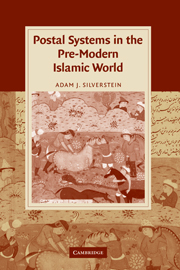Book contents
- Frontmatter
- Contents
- List of maps
- Acknowledgements
- List of abbreviations
- Introduction
- PART I THE PRE-ISLAMIC BACKGROUND
- PART II CONQUEST AND CENTRALISATION – THE ARABS
- PART III CONQUEST AND CENTRALISATION – THE MONGOLS
- Conclusions
- Appendix: distances and speeds of the Barīd
- Bibliography
- Index
- Cambridge Studies in Islamic Civilization
Conclusions
Published online by Cambridge University Press: 18 July 2009
- Frontmatter
- Contents
- List of maps
- Acknowledgements
- List of abbreviations
- Introduction
- PART I THE PRE-ISLAMIC BACKGROUND
- PART II CONQUEST AND CENTRALISATION – THE ARABS
- PART III CONQUEST AND CENTRALISATION – THE MONGOLS
- Conclusions
- Appendix: distances and speeds of the Barīd
- Bibliography
- Index
- Cambridge Studies in Islamic Civilization
Summary
In the Sumerian Epic of Enmerkar and the Lord of Arrata (ca. 1800 BCE), a royal envoy's ineptitude is said to have had significant consequences: ‘The messenger's mouth was heavy, he could not repeat the message. [Thus] the Lord of Kulab patted some clay, he put the words on it as on a tablet. Before that time, words put on clay had never existed’ (ll. 500–14). According to this legend, one of the greatest inventions of all – writing – resulted from the actions of a Near Eastern courier. It would be an overstatement to suggest that couriers played roles of comparable importance in the pre-modern Islamic world, but the foregoing chapters have shown that their activities have been of enough significance to justify the creation and maintenance of complex postal systems throughout pre-modern Islamic history. A thorough analysis of these systems teaches us much about communications technology in the Near East in general and about Islamic state-building in particular.
I) The relationship between pre-modern postal systems and the exercise of political power was complex, for two reasons. First, the existence of well-maintained routes from the capital to the borders of the state also meant that a clear path from enemy territories to the capital was open to invaders, and it is no coincidence that some of the greatest conquest movements in history were accomplished along the Near East's venerable arteries of communication.
- Type
- Chapter
- Information
- Postal Systems in the Pre-Modern Islamic World , pp. 186 - 190Publisher: Cambridge University PressPrint publication year: 2007



